If you long for amazing weather, beautiful beaches, and want to live in a country of friendly and welcoming people, then Portugal could be the right place for you.
Portugal is becoming more popular by the day for digital nomads. It has amazing places to set up your laptop and work and fantastic infrastructure for remote workers.
The transport network is also excellent meaning can digital nomads can easily live further outside the more expensive city centres and still have convenient access to amenities.
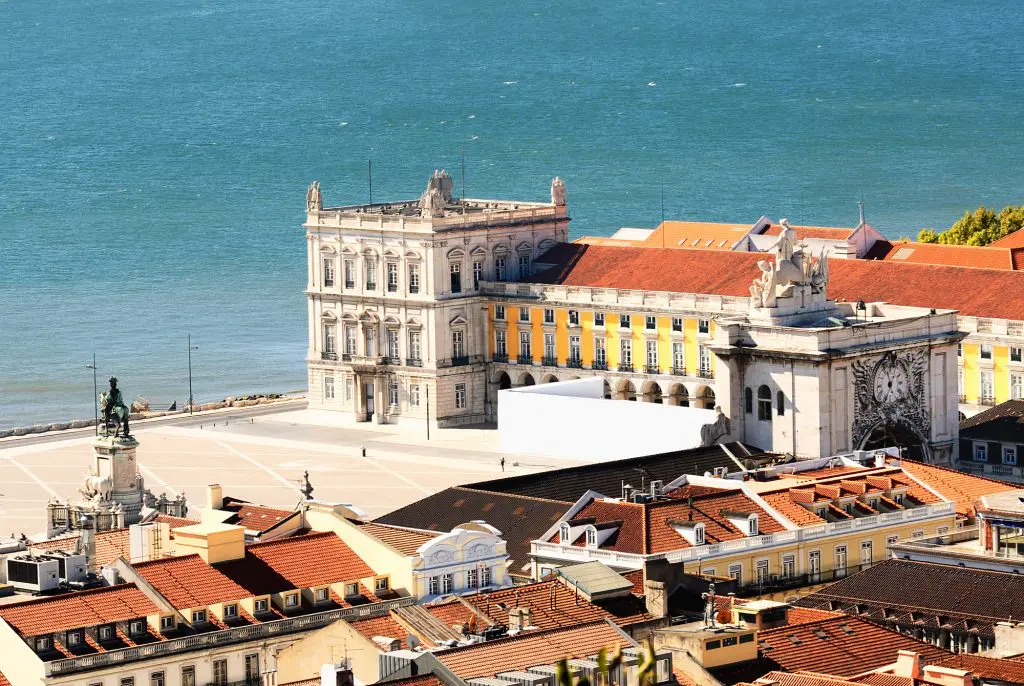
Portugal, located in southern Europe, is the oldest country on the continent. It’s even home to the oldest bookstore in the world. Portuguese locals love their coffee and wine— fun fact: Portugal is the world’s largest cork producer.
Travelling to or living in Portugal should be on every digital nomad’s bucket list, particularly as they have just launched a new digital nomad visa.
Keep reading to learn all about remote working in Portugal.
Five Reasons Portugal is Great for Digital Nomads
Portugal is the ideal spot for digital nomads. Let’s look at what draws remote workers to this spectacular part of the world.
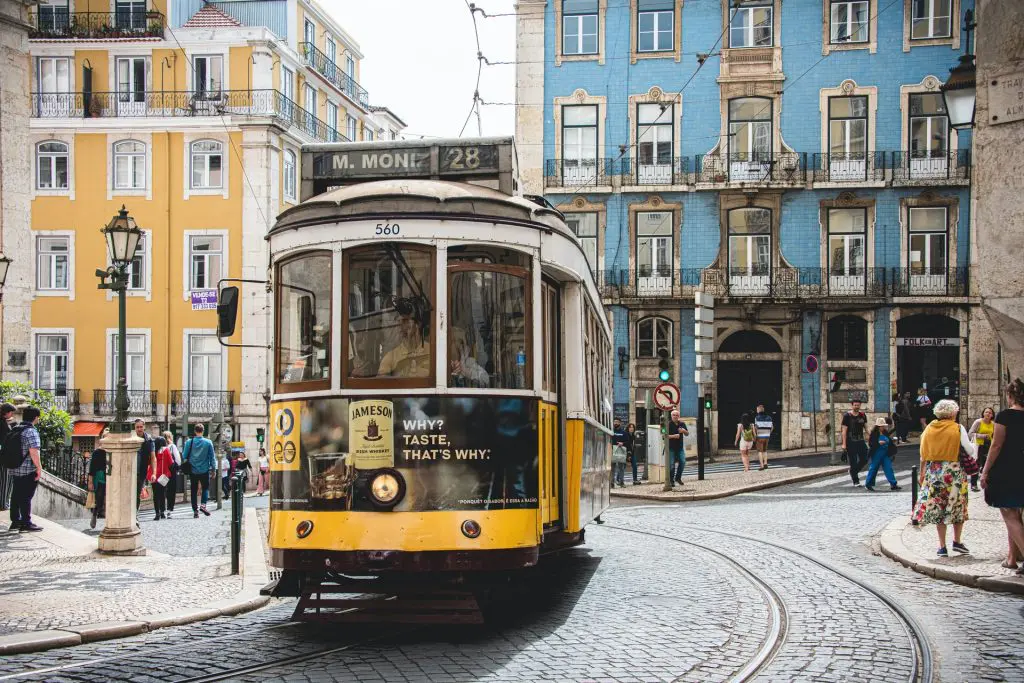
- It’s affordable. It’s known to have one of the lowest living costs in Western Europe. From groceries to accommodation, budgets don’t have to be too high when working in Portugal.
- The weather is amazing most of the year. Portugal’s weather is typically warm throughout the year, with winter being the wet season. There is an average of 5-6 hours of sunshine per day and with 830 km of coastline to enjoy, that’s a pretty great situation to be in.
- There is reliable internet. Portugal features a high-speed internet infrastructure with WiFi hotspots throughout the country.
- It’s easy to communicate. Not only do many Portugal natives speak English, especially in Lisbon, but they’re also very friendly. It doesn’t take much for digital nomads to feel welcomed and comfortable when they arrive in Portugal.
- There’s a strong foreigner community. Digital nomads can easily connect with other travellers in many Portuguese cities like Lisbon, Porto, and Braga.
- They have a digital nomad village in Madeira. It’s perfect for anyone who wants a ready made community and unique benefits.
- The food scene is incredible. With such a diverse local cuisine and huge choice of international restaurants, particularly in Lisbon, you will be spoiled for choice. Key staples include seafood, baked bread and pastries, wine, and coffee. Portugal will keep foodies busy for a long time.
- The Portugal Digital Nomad Visa: Yes, you can stay in Portugal as a tourist for 90 days depending on your passport but they also have the D7 visa which anyone with savings receiving passive income or a stable remote job can apply for as well as a brand new digital nomad visa.
Read More: How to Travel Through the Schengen Visa Free as a Digital Nomad
Best Cities for Digital Nomads: Deciding Where to Live in Portugal
Portugal is perfect for digital nomads for so many reasons not least its relative affordability compared to the rest of western Europe. Rent will be your biggest expensive, particularly if you live in Lisbon but the lower cost of living overall can offset this cost.
Here are our top five cities in Portugal where you will find an increasing number of digital nomads.
Lisbon
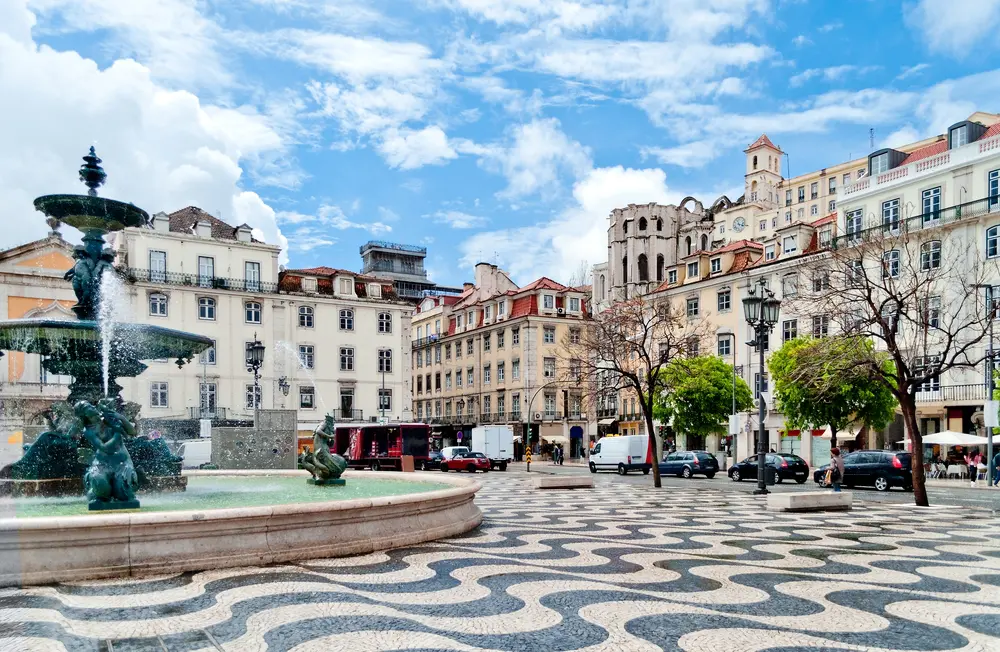
Portugal’s capital, Lisbon, is vibrant and filled with culture. It’s the perfect destination for digital nomads who enjoy working in cafes and coworking spaces (keep reading for the best ones). There a Meetup group for Lisbon Digital Nomads (and many others depending on your interests) which offers a great way to get together with like-minded people and explore Lisbon together.
While you’re in Lisbon, make sure you explore some historical sites. A few noteworthy ones are The Lisbon Cathedral and the Carmo Convent and Church. Wandering the city’s vibrant districts and seeing everything they offer will keep you busy when you are not working.
For some mouthwatering Portuguese food, check out Time Out Market Lisboa. At Time Out, You can enjoy cuisine from over 40 different restaurants.
Useful website: For finding your perfect district in Lisbon, helpful tips about your local area, and helpful tips to get used to life in Portugal, HoodPicker is an amazing resource.
Porto
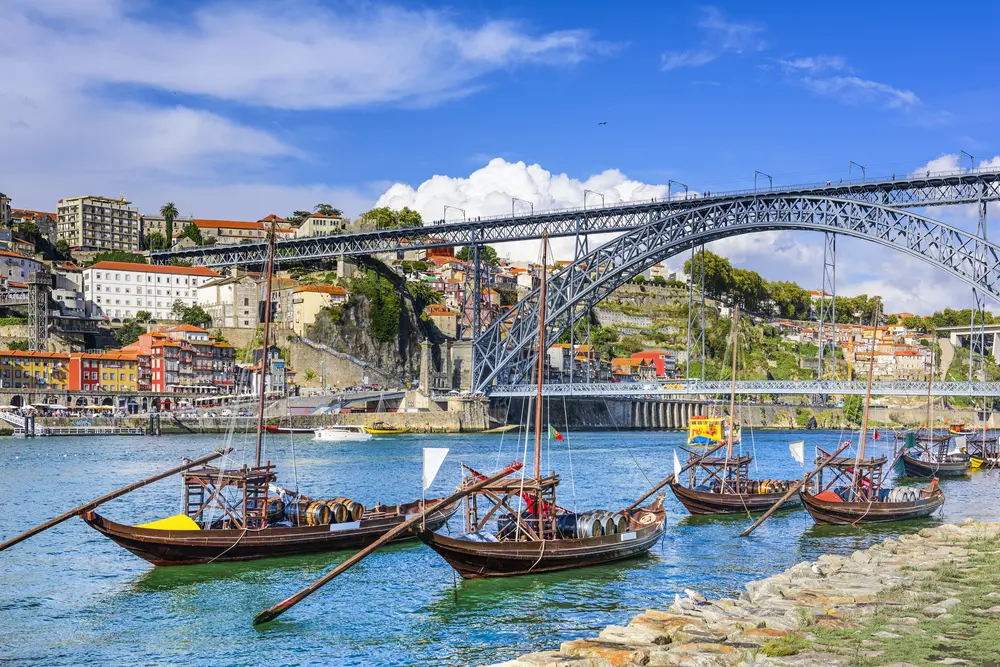
Smaller than the capital, Porto offers a homey and cheerful vibe. Digital nomads are attracted to Porto because it offers a great quality of living.
The infrastructure in Porto continues to grow rapidly and is an excellent place to network as it has become so popular with remote workers in recent years.
Porto is an easy city centre to navigate on foot, despite the many staircases and hills that will keep you fit, but you will also find an excellent subway and bus system for when you need to go to the airport or a day trip. Of course, don’t miss the iconic french-inspired Sāo Bento Train Station.
Porto offers a lot to lovers of history and food like much of Portugal. It’s even home to the UNESCO World Heritage Site Ribeira riverside.
For a quick day trip from Porto, Duro Valley is recommended for wine lovers.
Read More: 25 Best Places for Digital Nomads in Europe
Braga
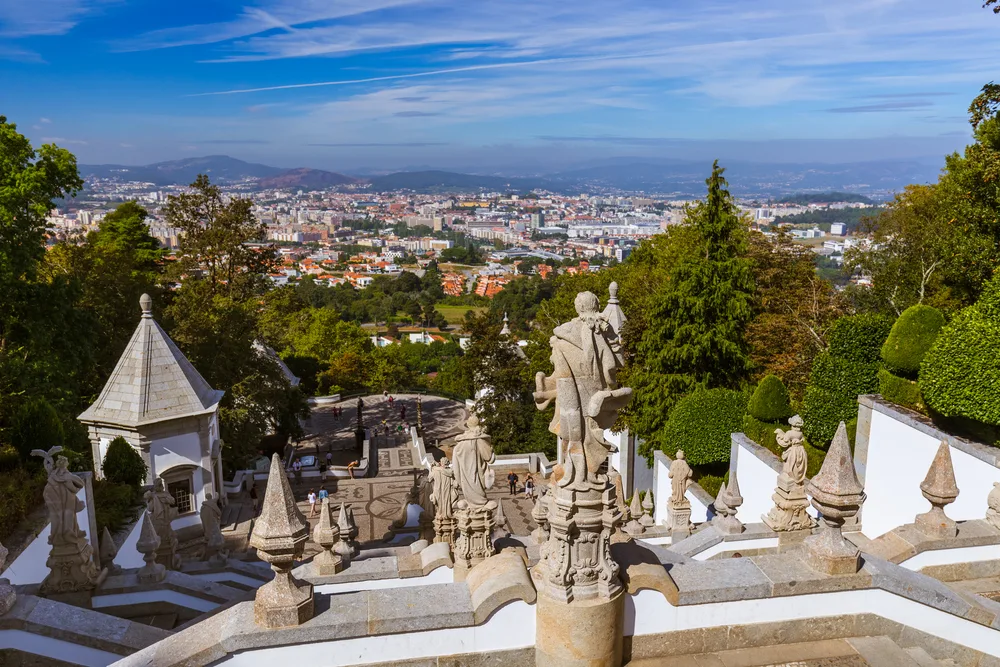
Portugal’s third-largest city is becoming increasingly popular with digital nomads hoping to save money while also living in a vibrant university town in Portugal. The historic centre is where most of the action can be found and is packed with restaurants, cafes, and bars to enjoy.
It’s famous for its culture and offers historical monuments and gardens to explore with one of Portugal’s most recognizable icons, the pilgrimage site Bom Jesus do Monte, just twenty minutes away by bus.
Braga is also convenient for people wanting to visit Spain as it’s closer to the border with easy access to Porto.
Minho
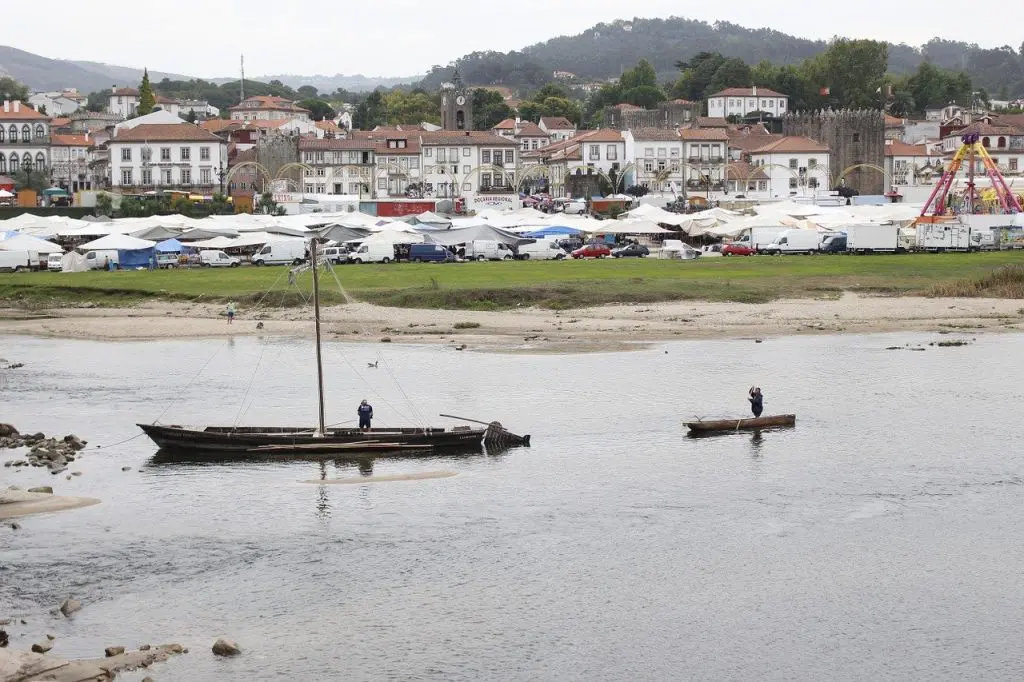
Last up on our list of best cities in Portugal for digital nomads is Minho, the first Portuguese city. Like the rest of Portugal, it’s an affordable place to live and travel from.
If you love exploring stunning nature on your time off, Minho is the place to be. It’s located close to Peneda-Gerês National Park, Portugal’s only national park. If you’re a foodie and wine lover, Minho has you covered.
Tip: DigitalNomads.PT is an excellent resource about Portugal for digital nomads.
Read More: A Digital Nomad Guide to Spain (Everything You Need to Know)
Cost of Living in Portugal
As we mentioned, Portugal is becoming more noticed and visited by digital nomads. A top reason for this is its low cost of living.
While prices vary from city to city, costs are generally low no matter where you go. In fact, Portugal has been determined to have the lowest cost of living in western Europe.
- Costs of accommodation: The average monthly rent in Lisbon is between 900USD – 1500 USD in Lisbon and outside the city is about 700 USD. Of course, this depends on the neighbourhood and the size of accommodation you’re looking for. Luckily Portugal is a very safe country, so there are many options.
- Costs for food and drink: The average meal cost about 10 USD, and coffee typically costs less than 2 USD.
- Costs for transportation: The average one-way ticket for local transport is less than 2 USD and 50 USD for a monthly pass. Taxis are also available at an affordable price.
Read More: Accommodation for Digital Nomads — The Best Options
Cafes and Coworking Spaces in Portugal
As Portugal for digital nomads is becoming more popular, cafes and coworking spaces are booming. Check out some prime spots to work in the cities mentioned above.
- Comoba Cafe, located in Lisbon’s city centre near Tejo River, offers delicious coffee and food. It’s laptop friendly and offers fast internet.
- Mesa 325: Claimed to offer the best coffee in Porto, this cafe has a lot more to offer! The vibe is relaxing, there’s highspeed WiFi, and plenty of seating options to settle in and do some work.
- Second Home Lisboa: This is a co-working space where entrepreneurs, innovators, and digital nomads come together in Lisbon. There are tons of plants that give a calming, jungle vibe and there is ample space to get your work done.
- Porto i/o: Offering 4 different co-working spaces throughout Porto, Porto i/o buildings are all uniquely historical. They each provide a network of digital workers to collaborate and work with.
Read More: Best Coworking Spaces in Portugal (Lisbon, Porto, Braga)
Downsides of Remote Working in Portugal
Portugal for digital nomads certainly has more advantages than disadvantages. However, here are a few potential downsides to be aware of.
- Unless you want to become a tax resident and pay taxes in Portugal, you must limit your time to 183 days or less. If you don’t want to do this then six months is plenty of time to explore Portugal. People applying to stay in Portugal long-term as a resident will have to organize their tax situation as part of the application.
- The language can be difficult to learn, but a few words go a long way. (We’ll discuss this more in a moment!)
- It can get cold in the winter as many houses aren’t well insulated and don’t have central heating. It’s a small price to pay for great weather year-round but worth bearing in mind!
- Post can be slow to Portugal and things get held up at customs (for a long time) easily, especially if they are from outside the EU. One way to combat this is to purchase things from within Europe and make sure they are below approximately twenty-five dollars.
Read More: A Guide to Romania for Remote Workers & Digital Nomads
Is Portugal LGBTQ+ Friendly?
This is an ideal choice for LGBTQ+ remote workers as Portugal has repeatedly been named one of the most queer-friendly countries in the world. Lisbon is the capital, the epicenter if you want to get involved with the local gay nightlife, and clubs, or live in one of the particularly gay districts (Arroios and Misericórdia).
There are also laws protecting people of the LGBTQI+ community, and while there is still some social conservatism within the general population, overall people are incredibly welcoming and friendly.
Read More: The Best Travel and Health Insurance for Digital Nomads (compared)
Do I Need to Learn Portuguese?
As mentioned above, learning Portuguese can be difficult compared to other languages. Some say it takes the same time and effort as learning Spanish. There are nine vowel sounds in Portuguese and several silent letters.
The fact that many Portugal locals speak English makes communication very simple in Portugal. It never hurts to learn a few basic words and phrases. This allows you to experience the culture. Locals appreciate it when you show interest in their language (even if you don’t speak it perfectly).
Here are a few basic Portuguese phrases:
- Olá – hello
- Tchau – informal goodbye
- Adeus – formal goodbye
- Por favor – please
- Tudo bem? – How are you?
- Quanto custa? — How much does this cost?
- Sim – yes
- Não – no
You can download apps such as Duolingo or Lingodeer to get started with some basic language learning.
Read more: 10 Best Websites For Finding Online Work Now
Final Thoughts
Portugal for digital nomads is an excellent idea for many reasons. It’s a picturesque and warm country that offers an excellent quality of life and a welcoming atmosphere. It’s no wonder it has become one of the most sought-after destinations for remote workers in recent years.
Read about European countries offering visas for freelancers, (Portugal is on the list).


